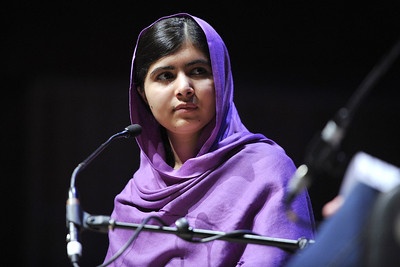In 2014, Malala Yousafzai became the youngest ever Nobel Prize Winner for her activism fighting for the educational rights of all children. The story of how Malala came to be one of the best-known activists in the world is nothing short of remarkable.
Born in Mingora, Pakistan on the 12th July 1997, Malala was raised in a family that ran public schools in the community. Throughout her childhood, Malala’s father was determined to ensure she had access to the same opportunities as boys in Pakistan; particularly with regards to education. In 2009 when the Taliban closed all girls’ schools in the Swat district, 12-year-old Malala began blogging for BBC Urdu; voicing her upset and anger that she could no longer attend school. For a teenage girl to openly criticise the Taliban, an extremist political group with a history of violence, was an incredibly brave move. Her advocacy for education for women lead to a nomination for the International Children’s Peace Prize.
Sadly, her speaking out against the Taliban also led to tragedy when, on 9th October 2012, Malala was shot by a Taliban gunman on her way home sitting an exam. The attack, in retaliation against her activism, resulted in Malala being left in a coma and flown to the UK for emergency treatment. Fortunately, after 10 days, she woke up and began to make a miraculous recovery. Her attack was condemned by global leaders and garnered media attention around the world, shining a spotlight on Yousefzai’s brave fight for equality.

Since her attack, Malala has actively supported projects and policies that aim to improve the lives of young women through accessible education, better work opportunities and reducing child marriage. In 2013 Malala and her father founded the Malala Fund, a charity which aims to ensure all girls have access to free, safe, quality education. I think it’s really important to have a young woman who has been directly affected by inequality at the forefront of education rights conversations as it ensures that the voices of those affected are heard.
In 2014, Malala became the youngest person to be awarded the Nobel Prize in recognition of her “struggle against the suppression of children and young people and for the right of all children to education.” The fact that a young Muslim woman plays such as prominent role in gender rights and has garnered so much respect through her advocacy is particularly poignant. Throughout history women, particularly women of colour, have been overlooked or excluded so Malala’s role in education, politics and human rights is cause for much celebration. Her journey from oppression to global change-maker is inspirational and I can’t think of a better example of someone who has fought through the greatest of challenges to ensure a better life for future generations.
